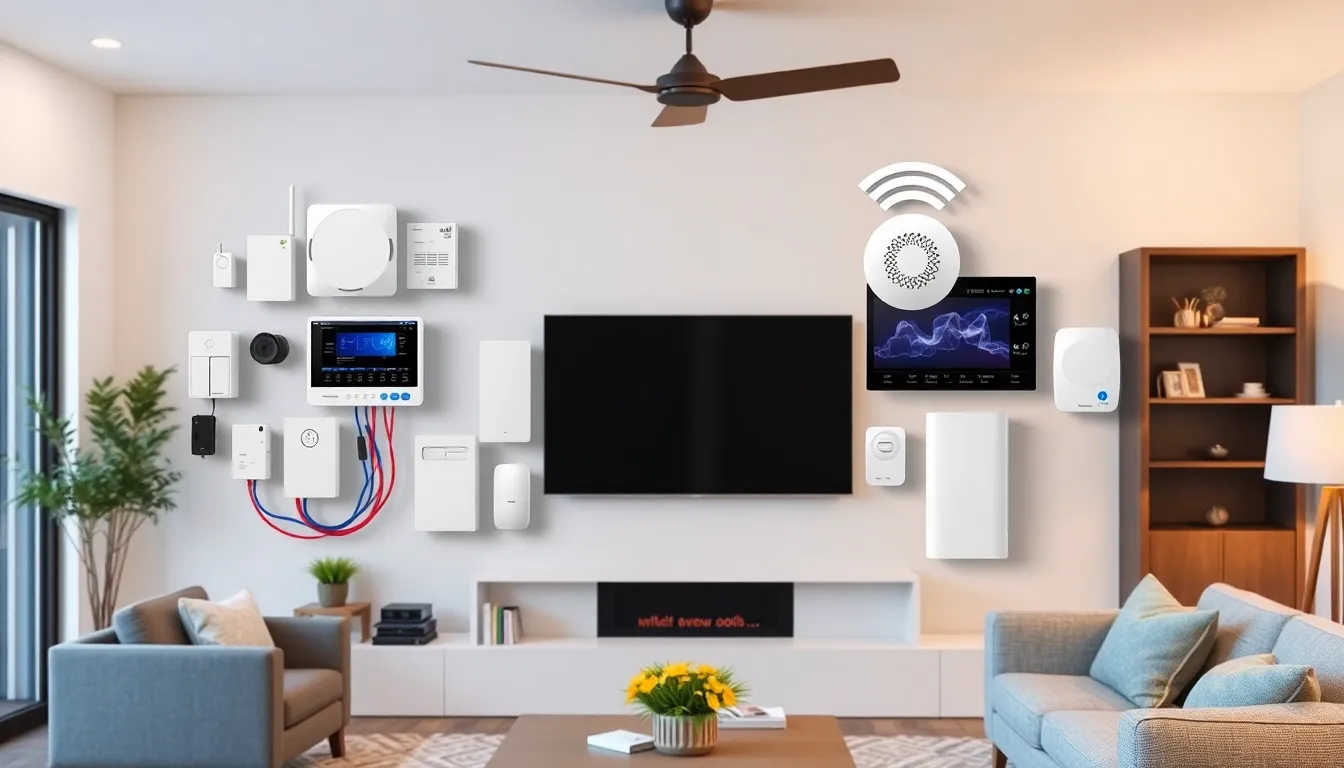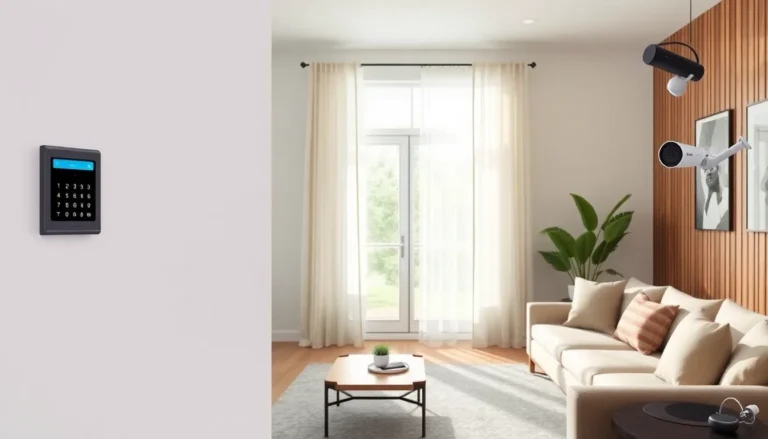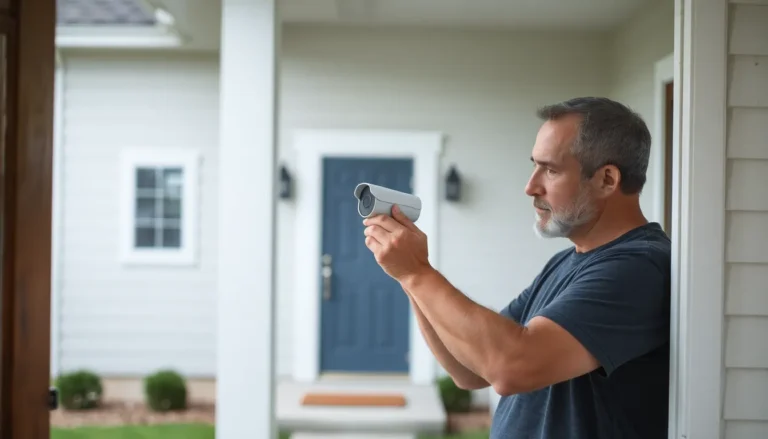In a world where the unexpected can knock on your door at any moment—sometimes literally—security alarms are the unsung heroes of home protection. Imagine waking up to the sound of a friendly voice reminding you that your home is as safe as Fort Knox, minus the moat and the alligators. With the right security alarm, you can sleep soundly, knowing that your castle is guarded against unwanted intruders.
Table of Contents
ToggleOverview Of Security Alarms
Security alarms serve as vital components in modern home protection. They detect unauthorized access and alert homeowners promptly. Sensors and cameras work together, enhancing security systems. Intruders trigger alarm sounds that deter further intrusion.
Several types of security alarms exist, such as wired, wireless, and smart options. Wired systems offer reliability but require professional installation. Wireless alarms provide flexibility and easier setup, offering scalability for future needs. Smart security alarms integrate with home automation, allowing remote monitoring through smartphones.
Alarm monitoring can occur in two main ways. Self-monitoring involves direct alerts to homeowners through notifications. Professional monitoring sends alerts to a monitoring center, ensuring prompt response from authorities. Studies show that professionally monitored systems can reduce burglary rates by up to 50 percent.
Several features enhance security alarms’ effectiveness. Motion detectors capture movement within both indoor and outdoor spaces. Window and door sensors detect unauthorized entry, adding layers of protection. Cameras facilitate visual verification, assisting in identification and documentation of events.
Investing in a quality security alarm can result in significant benefits. Homeowners experience greater peace of mind, knowing they are protected against potential threats. Insurance companies often offer discounts for homes equipped with alarm systems. As a result, security alarms not only safeguard properties but also contribute to overall financial savings.
Types Of Security Alarms

Security alarms come in various forms, serving distinct needs in home protection. Understanding the differences helps in choosing the best option.
Wired Security Alarms
Wired security alarms are known for their reliability and constant connectivity. These systems require professional installation, ensuring secure connections throughout the property. Power sources typically remain uninterrupted, lowering the risk of disconnection during a power failure. Installation can be time-consuming, but homeowners benefit from a robust and long-lasting setup. Many of these alarms integrate features like motion sensors and window contacts for enhanced monitoring. Since there is minimal risk of interference, wired systems provide consistent performance that appeals to many homeowners.
Wireless Security Alarms
Wireless security alarms emphasize flexibility and easy installation. These systems rely on battery power and transmit signals via radio waves, making setup simple and often DIY-friendly. Various styles and designs allow for customized placement around a home, accommodating unique layouts. Wireless options may include advanced features such as smartphone integration for remote monitoring. Signal range can vary, so understanding the specific layout is essential for optimal performance. Homeowners appreciate the convenience and adaptability that wireless systems provide, along with a lower installation cost compared to wired alternatives.
Features To Consider
Security alarms come equipped with several features that enhance home protection. Homeowners should evaluate these features to determine the best fit for their security needs.
Monitoring Options
Monitoring options play a crucial role in how effectively a security alarm functions. Professional monitoring offers immediate response from authorities during emergencies. This method significantly reduces response time, increasing safety. Self-monitoring, while less costly, allows homeowners to receive alerts directly on their mobile devices. Weighing these choices ensures that homeowners select the most effective monitoring system for their lifestyle.
Smart Home Integration
Smart home integration elevates security alarms by connecting them to other smart devices. Alarms can communicate with smart lights, cameras, and locks to create a coordinated security network. This technology allows users to control their systems remotely via smartphone apps. Home automation features add convenience and enhance home security, making it simpler to manage multiple aspects of home safety. Integration with voice assistants also provides an added layer of accessibility and control.
Benefits Of Security Alarms
Security alarms provide numerous advantages, enhancing safety and security for homeowners. Their presence significantly impacts crime rates and personal comfort.
Crime Prevention
Security alarms deter potential intruders effectively. Studies show that homes with alarms are less appealing targets, with vandalism reduced by up to 30 percent. Alarm systems trigger loud sirens that alert homeowners and neighbors, potentially scaring off burglars. Moreover, the visibility of security equipment, such as cameras and signage, adds another layer of defense. Alarm monitoring also ensures prompt alerts to authorities if an intrusion occurs, increasing the likelihood of quick responses. Overall, the presence of security alarms fosters a safer community environment by discouraging criminal activity.
Peace Of Mind
Homeowners enjoy a sense of comfort with security alarms in place. Knowing that their property is protected allows them to relax, whether they’re at home or away. Reliable systems send instant alerts directly to mobile devices, making it easier to monitor lingering threats. Furthermore, professional monitoring services provide added reassurance, ensuring that trained personnel oversee security around the clock. Families can rest easy, confident in the knowledge that help is always available. Effective security alarms not only protect property but also create an atmosphere of safety and well-being.
Choosing The Right Security Alarm
Selecting the appropriate security alarm involves evaluating several key factors. First, consider the type of system that best fits a home’s layout. Wired alarms provide reliability through stable connections, while wireless options offer convenience and flexibility. Wireless systems often allow for easier installation, ideal for those preferring a DIY approach.
Next, assess the monitoring preferences. Self-monitoring sends alerts directly to mobile devices, giving homeowners instant information. Conversely, professional monitoring provides ongoing surveillance, ensuring prompt responses from authorities in case of an emergency. Research shows that professionally monitored systems can lead to a 50 percent reduction in burglary rates.
Evaluating additional features can further enhance security. Motion detectors and window sensors detect suspicious activity. Cameras offer visual verification, adding another layer of protection. Choosing alarms with integrated smart home technology allows seamless operation with other devices, promoting efficient management through smartphone apps.
Budget considerations play a crucial role in the selection process. Quality systems may require an initial investment but can result in long-term savings. Many insurance companies provide discounts to policyholders with functioning security alarms, creating financial benefits beyond personal safety.
Lastly, engaging in thorough research helps to ensure an informed decision. Reading customer reviews offers insights into the performance and reliability of various brands. Consulting with security experts can provide tailored recommendations based on individual needs, enhancing overall protection. Choosing the right security alarm establishes a comprehensive security framework, ensuring peace of mind and safeguarding a home effectively.
Investing in a security alarm system is a proactive step toward safeguarding a home and enhancing personal safety. With various options available homeowners can choose a system that best fits their needs and preferences. The right security alarm not only deters intruders but also provides invaluable peace of mind.
By understanding the features and monitoring options, individuals can make informed decisions that align with their lifestyle. A well-chosen security alarm system can lead to a safer living environment while potentially lowering insurance costs. Ultimately, prioritizing home security is essential for fostering a sense of well-being and community safety.



